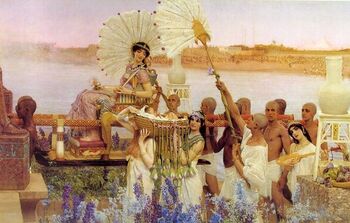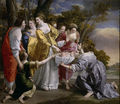Difference between revisions of "Category:Childhood of Moses (subject)"
| Line 56: | Line 56: | ||
'' 11 One day, after Moses had grown up, he went out to his people and saw their forced labor. He saw an Egyptian beating a Hebrew, one of his kinsfolk. 12 He looked this way and that, and seeing no one he killed the Egyptian and hid him in the sand. 13 When he went out the next day, he saw two Hebrews fighting; and he said to the one who was in the wrong, “Why do you strike your fellow Hebrew?” 14 He answered, “Who made you a ruler and judge over us? Do you mean to kill me as you killed the Egyptian?” Then Moses was afraid and thought, “Surely the thing is known.” 15 When Pharaoh heard of it, he sought to kill Moses. '' | '' 11 One day, after Moses had grown up, he went out to his people and saw their forced labor. He saw an Egyptian beating a Hebrew, one of his kinsfolk. 12 He looked this way and that, and seeing no one he killed the Egyptian and hid him in the sand. 13 When he went out the next day, he saw two Hebrews fighting; and he said to the one who was in the wrong, “Why do you strike your fellow Hebrew?” 14 He answered, “Who made you a ruler and judge over us? Do you mean to kill me as you killed the Egyptian?” Then Moses was afraid and thought, “Surely the thing is known.” 15 When Pharaoh heard of it, he sought to kill Moses. '' | ||
== (c) Moses Marries Zipporah (End of Childhood) | == (c) Moses Marries Zipporah (End of Childhood) == | ||
==== In ancient sources ==== | ==== In ancient sources ==== | ||
Revision as of 11:11, 4 February 2021
The Childhood of Moses refers to the coming to age of Moses.
Overview
Childhood in ancient Israel was defined as the period between birth and marriage. In this case (like in the case of David) we have the childhood of a man destined to become a (political and military) leader. As a baby Moses has to face some special challenges that derived from his own destiny. As a teenager (like every other man coming to age) he had to prove himself and affirm his identity. For a military leader that meant the (first) killing of his enemy.
(a) Finding of Moses
As a baby, Moses was rescued from the water. To save his life from the Pharaoh who ordered all Hebrew boys to be killed, his family abandoned him in a papyrus basket in the waters of the river Nile. He was found and adopted by the daughter of the Pharaoh.
(b) Moses raised at the Egyptian court
Moses was raised as an Egyptian, but the loyalty to his family and the blood ties with his people were stronger. When as a teenager he saw an Egyptian who was beating a Hebrew, he killed him. He fled from Pharaoh to the land of Midian.
(c) Moses marries Zipporah
As usual, the childhood and coming to age ends at a well. There Moses met "Zipporah" and her sisters. Once again, Moses has to prove himself, by defending Zipporah and her sisters. They married and had a son.
(a) Finding of Moses (Infancy)
In ancient sources
Exodus 1 - 8 Now a new king arose over Egypt, who did not know Joseph. 9 He said to his people, “Look, the Israelite people are more numerous and more powerful than we. 10 Come, let us deal shrewdly with them, or they will increase and, in the event of war, join our enemies and fight against us and escape from the land.” 11 Therefore they set taskmasters over them to oppress them with forced labor... 22 Then Pharaoh commanded all his people, “Every boy that is born to the Hebrews[a] you shall throw into the Nile, but you shall let every girl live.”
Exodus 2 - 2 Now a man from the house of Levi went and married a Levite woman. 2 The woman conceived and bore a son; and when she saw that he was a fine baby, she hid him three months. 3 When she could hide him no longer she got a papyrus basket for him, and plastered it with bitumen and pitch; she put the child in it and placed it among the reeds on the bank of the river. 4 His sister stood at a distance, to see what would happen to him.
5 The daughter of Pharaoh came down to bathe at the river, while her attendants walked beside the river. She saw the basket among the reeds and sent her maid to bring it. 6 When she opened it, she saw the child. He was crying, and she took pity on him. “This must be one of the Hebrews’ children,” she said. 7 Then his sister said to Pharaoh’s daughter, “Shall I go and get you a nurse from the Hebrew women to nurse the child for you?” 8 Pharaoh’s daughter said to her, “Yes.” So the girl went and called the child’s mother. 9 Pharaoh’s daughter said to her, “Take this child and nurse it for me, and I will give you your wages.” So the woman took the child and nursed it. 10 When the child grew up, she brought him to Pharaoh’s daughter, and she took him as her son. She named him Moses,[a] “because,” she said, “I drew him out[b] of the water.”
In visual arts
(b) Moses raised at the Eguptian court (Coming to Age)
In ancient sources
11 One day, after Moses had grown up, he went out to his people and saw their forced labor. He saw an Egyptian beating a Hebrew, one of his kinsfolk. 12 He looked this way and that, and seeing no one he killed the Egyptian and hid him in the sand. 13 When he went out the next day, he saw two Hebrews fighting; and he said to the one who was in the wrong, “Why do you strike your fellow Hebrew?” 14 He answered, “Who made you a ruler and judge over us? Do you mean to kill me as you killed the Egyptian?” Then Moses was afraid and thought, “Surely the thing is known.” 15 When Pharaoh heard of it, he sought to kill Moses.
(c) Moses Marries Zipporah (End of Childhood)
In ancient sources
But Moses fled from Pharaoh. He settled in the land of Midian, and sat down by a well. 16 The priest of Midian had seven daughters. They came to draw water, and filled the troughs to water their father’s flock. 17 But some shepherds came and drove them away. Moses got up and came to their defense and watered their flock. 18 When they returned to their father Reuel, he said, “How is it that you have come back so soon today?” 19 They said, “An Egyptian helped us against the shepherds; he even drew water for us and watered the flock.” 20 He said to his daughters, “Where is he? Why did you leave the man? Invite him to break bread.” 21 Moses agreed to stay with the man, and he gave Moses his daughter Zipporah in marriage. 22 She bore a son, and he named him Gershom; for he said, “I have been an alien[c] residing in a foreign land.”
23 After a long time the king of Egypt died. The Israelites groaned under their slavery, and cried out. Out of the slavery their cry for help rose up to God. 24 God heard their groaning, and God remembered his covenant with Abraham, Isaac, and Jacob. 25 God looked upon the Israelites, and God took notice of them.
References
- / [[]] / In: The Anchor Bible Dictionary (1992 Freedman), dictionary,
External links
- [ Wikipedia]
Pages in category "Childhood of Moses (subject)"
The following 19 pages are in this category, out of 19 total.
1
- Moses Rescued from the Nile (1560 Abbate), art
- Finding of Moses (1580 Veronese), art
- Finding of Moses (1633 Gentileschi), art
- Finding of Moses (1634 Grebber), art
- Finding of Moses (1638 Poussin), art
- Finding of Moses (1640 Assereto), art
- Finding of Moses (1651 Poussin), art
- Finding of Moses (1660 Bourdon), art
- The Finding of Moses (1661 Bray), art
- Finding of Moses (1730 Pittoni), art
- Finding of Moses (1740 Tiepolo), art
- Finding of Moses (1862 Goodall), art
- The Moses Basket (1868 Brazzà), art
- Young Moses (1878 Moreau), art
- Finding of Moses (1886 Long), art
- Finding of Moses (1892 Peel), art
- Finding of Moses (1904 Alma-Tadema), art
















